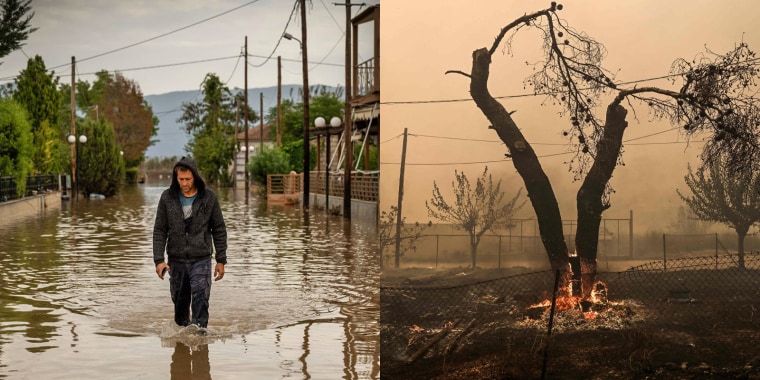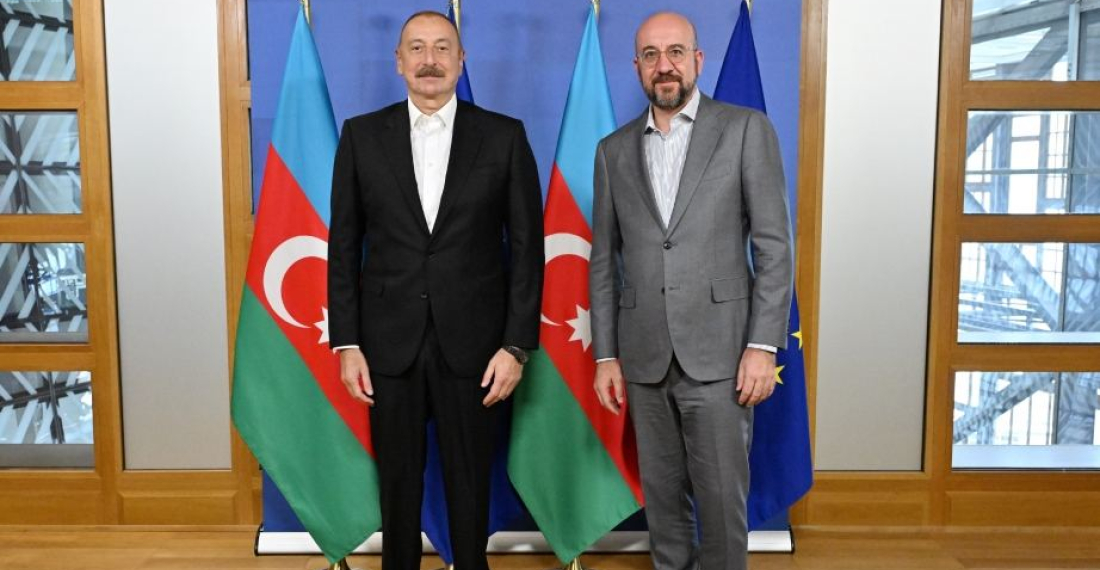Record rainfall and wildfires have devastated the country since the summer. Here’s a look at the disasters that will leave the country changed for years.

Oct. 8, 2023,
By Mithil Aggarwal and Jiachuan Wu
Greece is at war with climate change.
Wildfires and record rainfall devastated the country this summer, first scorching entire forests then flooding complete towns.
Here’s a look at two months of disasters that will leave the country changed for years.
The fires
The blaze began near the city of Alexandroupolis in the eastern Evros region on Aug. 19, spreading rapidly, merging with smaller fires and forming an inferno that reduced hundreds of square miles of forest to dust and ash.
The extent of the Greek wildfires
More than 672 square miles have burned so far this year.

GREECE
Athens
BULGARIA
Burnt area
Aug. 19-Sept. 14
GREECE
Aegean Sea

GREECE
Athens
BULGARIA
Burnt area
Aug. 19-Sept. 14
GREECE
Aegean Sea

GREECE
Athens
BULGARIA
Burnt area
Aug. 19-Sept. 14
GREECE
Aegean Sea
Overnight, walls of flames raged through forests, prompting authorities to evacuate complete villages and hospitals as first responders battled to tame the fire for days.
Hundreds of firefighters from Greece and across the European Union were deployed along with dozens of aircraft.
The hot, tinder-dry conditions, which scientists said were made worse by climate change, created one of Greece’s hottest summers on record and the perfect conditions for blazes that killed at least 18 people.
While the total number of fires recorded through Wednesday this year, 51, is lower than last year’s total of 66, the blazes have burned almost nine times more land.
The fires were the largest ever faced by the European Union, Janez Lenarčič, the European commissioner for crisis management, said in August.
Scientists say extreme weather phenomena are only going to be more common as the effects of climate change worsen.
When all was over in early September, residents had begun to return to what remained of their villages only to be battered by record rainfall.
The floods
Storm Daniel, the deadly cyclone that flooded areas of the Mediterranean from Greece to Libya in early September, became one of the most fierce storms Greece had ever seen, sweeping houses off their foundations with rainfall that lasted three days and claimed at least 17 lives.
In the year to mid-September, 51 fires burned more than 672 square miles in Greece.
Homes and roads were destroyed, bridges collapsed, and fertile crops in the Thessaly plains in western Greece — known as the country’s breadbasket — were wiped out.
Many farmers lost their life’s work.
The flood area in Greece

GREECE
Athens
Aegean Sea
Flooding area as of Sept. 10
Larissa
Marathea
Palamas
Karditsa
In rural towns like Koskinas and Palamas, which were among some of the worst-hit areas, walls were ripped off of homes and cars were covered in thick sludge as people searched for their belongings for days.
Georgia Bloufa, a 60-year-old widow in Palamas, worked at a local restaurant that was destroyed by the floods. She escaped her family’s house around 5 a.m., her youngest grandson carried on his father’s shoulders. Her cousin called the police, but it was no use.
“They said they don’t know anything,” she previously told NBC News. “People were not warned.”
Flood damage in the village of Koskinas, in the central region of Thessaly, Greece


Greek Prime Minister Kyriakos Mitsotakis said last month the country has faced “an unprecedented weather event, a catastrophe of immense proportions.”
“We need an unprecedented response,” he told European Parliament President Roberta Metsola.
Flood damage in the village of Agia Triada, Greece


Just a few days later, Storm Elias wreaked havoc on the port city of Volos, again flooding streets that had barely dried up from the previous disaster.
More than 3,000 people had been relocated due to the crippling rain, the country’s fire service said last week.
Mithil Aggarwal is a Hong Kong-based reporter/producer for NBC News.











